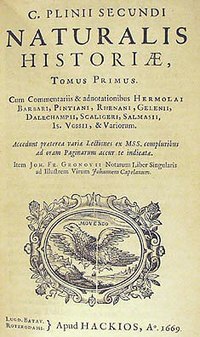
Back Plinius die ouere Afrikaans Plinius der Ältere ALS Plinio o Viello AN بلينيوس الأكبر Arabic پلينيوس لقديم ARY بلينيوس الاكبر ARZ প্লিনি দ্য এল্ডাৰ Assamese Pliniu "El Vieyu" AST Böyük Plini Azerbaijani Пліній Старэйшы Byelorussian
Pliny the Elder or Gaius Plinius Secundus | |
|---|---|
 Pliny the Elder: an imaginative 19th century portrait. No contemporary depiction of Pliny has survived. | |
| Born | 23 AD |
| Died | August 25, 79 (aged 55–56) |
| Cause of death | Died in the eruption that destroyed Pompeii |
| Body discovered | By friends, under the pumice |
| Citizenship | Roman |
| Education | Rhetoric, grammar |
| Occupation(s) | Lawyer, author, natural philosopher, military commander, provincial governor |
| Notable work | Natural History |
| Spouse | None |
| Children | None |
| Parent(s) | Celer and Marcella |
| Relatives | Sister (Plinia), nephew (Pliny the Younger) |

Gaius Plinius Secundus (23 AD – 25 August 79 AD), better known as Pliny the Elder, was a Roman author, naturalist, and natural philosopher, as well as naval and army commander of the early Roman Empire, and personal friend of the emperor Vespasian.
Spending most of his spare time studying, writing or investigating natural and geographic phenomena in the field, he wrote an encyclopedic work, Natural History ("Naturalis Historia"), which became a model for many subsequent encyclopedic texts.
Pliny the Elder died on 25 August 79 AD. He was attempting the rescue by ship of a friend and his family from the eruption of Mount Vesuvius. The eruption had just destroyed the cities of Pompeii and Herculaneum.